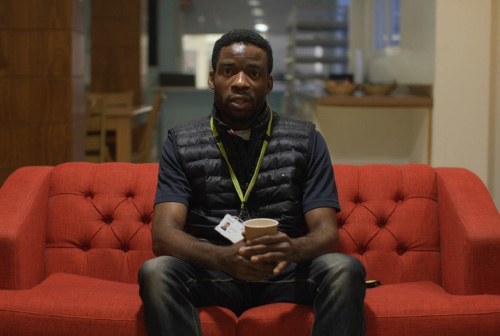Abbey started her career in Learning Disability social care after doing some part-time hours as Bank Staff, while she studied for her law degree.
She never thought she’d be a Nurse – as she was very squeamish when she was younger!
But to her surprise, she fell in love with social care and was promoted from Support Worker to a Senior and has recently completed the Nurse Associate Apprenticeship last October. She is currently on the Mental Health nursing top up Apprenticeship course which she started in February and will qualify as a Mental Health Nurse in September 2025.
Abbey – thanks for your time! Tell us how a Law Graduate ended up working in social care?
I always thought I’d be a teacher as a child. I wanted to do a traditional academic route, but my career goal changed from teaching in college, and I ended up completing a Law Degree at Sheffield Hallam University.
In my 2nd year of University, I wanted to get some part-time work. A friend of mine was working at the Fields. She said I could get bank work and I’d enjoy it. I did -I absolutely loved it!
So you finished your law degree but how did you end up full-time at the Fields?
My manager said if I wanted some work while I looked for a legal post-graduate job, I could do some full-time work to tide me over.
I finished by final exam on the Friday and went on shift on the Saturday to start my full -time hours as a member of staff! I was a support worker on a 6-bed ‘locked’ unit at The Fields called ‘Poplars’, and my residents had challenging behaviors, but it was brilliant! I found a love for social care – I found it hugely rewarding despite the obvious challenging behaviors. Getting a simple smile or thank you from patients and seeing the difference I made meant more to me than the sort of changes I could facilitate within the legal field. I enjoyed the “hands on nature”.
Did you look for a job in law whilst working at the Fields as a Support Worker?
Yes – a year later I got a job at a solicitors in Sheffield in their conveyancing team. I stayed for 6 months, and it was a lovely environment and nice people but the 9-5 of office work wasn’t where I wanted to be!
I did enjoy helping people buy and sell houses, but after making such a direct difference to people’s lives at the Fields, I realized that’s what I wanted to do, and I even missed the 12-hour shifts which meant more days off in the week! I contacted my Manager at the Fields and luckily my position was still vacant, so I went back!
You were promoted quickly after you returned to Senior Support Worker – how was that?
I loved it – being Senior meant leading a unit and the 7 staff within it, taking responsibility for care planning, assessments, staffing and general running of the unit. Due to some staff changes, I eventually moved from ‘Poplars’ to ‘Hollies’ unit at The Fields and worked with staff I hadn’t worked directly with before. I was only 23 at this time and sometimes would have confidence wobbles, but my manager is brilliant. She encouraged the staff to support me in my new Senior role and they did. I really enjoyed it as a senior support worker, but then a Nurse Associate apprenticeship opportunity came up within Cygnet through the University College Birmingham.
You never would have guessed when you were younger you’d become a Nurse – that wasn’t in your plan was it?
No! When I was younger I was very squeamish but also had a traditional view on what a Nurse was. I imagined all Nurses as a general nurses working in a hospital setting. Working in social care changed my perception and made me see a new perspective of nursing.
Were your team supportive of you doing your Senior Role and the Nursing Apprenticeship at the same time?
Massively so – I had great support from Management and my team. In year 1 of the apprenticeship it’s mainly online lessons on Zoom so I could do that easily around my job.
Year 2 was a bit trickier as there are placements at various locations such as mental health, general and CAMHS hospitals, which meant I would be away from The Fields for a few weeks at a time over the year. My manager and Head of Care made sure my work could be covered while I was on placement at places such as Cygnet Sheffield! All my current work went towards my apprenticeship hours, I knew I was supported so didn’t have to worry about emails mounting up in my absence and I’m very fortunate that I was still paid while training. There aren’t many ways of training for a new job, whilst you are earning money!
I know friends that have done physiotherapy and nursing through university rather than an apprenticeship, and they don’t get paid while they do their placements. So many people do the placement by day and then have to do bar work or retail in the evening to bring in money.
I’m now qualified as a nurse associate and registered with the NMC. Fortunately, I have had the opportunity to complete a mental health nursing top up which I will complete in September 2025 and hopefully become a mental health nurse. The whole team at The Fields have continued to be extremely supportive of me through this next step of my nursing career journey and I’m very fortunate and thankful.
While we’re on the money topic, let’s discuss the elephant in the room!
When you thought you’d end up working in Law, you must have thought of a salary amount you’d be aiming towards over the time in your career. The assumption is healthcare isn’t well paid. Do you feel you’ve decreased your earning potential?
When I took the job at the solicitors, it was actually a pay cut from the work I’d done as Bank staff.
When you start in legal jobs, you really start on the bottom rung and have to work you’re way up which can take years and involves more training. To get to the ‘top’ – with more training, it would have taken years, and even then, you aren’t guaranteed anything as you need the right opportunity and vacancy to become available – and it’s not always easy to find that! I’ve always looked for progression in social care and this has also led to earning higher wages.
Once I qualify as a mental health Nurse – there are also Management qualifications available within Cygnet, so I may consider doing that – we’ll see!
Do you think you’ll stay within Learning Disabilities – especially as you are completing the Mental Health nurse top up course…. do you think you’d fancy a change of service?
No I don’t think so! LD Nurses get to manage the shifts in residential care – the nurse’s role is different to that of a nurse in a general hospital setting – they really get to run things. While it’s similar in mental health settings, my heart is in learning disability care, and I’ve worked with in social care now for eight years. There is so much crossover between mental health and learning disabilities, I see both LD and MH being able to complement each other, and it gives more diversity to both roles.
There are many residents with LD also have a MH condition like anxiety, depression or bipolar, but they aren’t always detected and assessed because the LD stops it from being easily diagnosed. It’s the same in mental health, there are many patients who may have undetected autism or LD, but it isn’t easily picked up. This is why I think there should be more awareness of Learning Disabilities and mental health in general hospital settings – so hopefully that change will happen!
So when you are a registered Nurse – you’ll still be thriving with that ‘hands on’ work ethic you seem to love?
Yes – Nurses at The Fields are involved in all parts of our resident’s care. There’s medication, staff checks, appointments and meetings. Some of the latter – where I’m speaking to other professionals like Doctors – I’d say the Law degree has come in very handy actually! I have a professional knowledge and understand the importance of DOLS, Safeguarding and assessing mental capacity so it’s given me a great deal of confidence.
At the same time, we support residents with all aspects of daily living such as with eating, drinking, showering and completing activities – it’s important to build rapport. You have to be a good balance of empathetic, VERY patient and have your heart in helping people, but also be resilient and able to set boundaries.
You can’t take anything personally – if you experience challenging behavior such as being hit or swore at from someone, you need to be able to walk away for 5 minutes and remember why you’re there – to support them. It’s important to maintain professional relationships with residents at work but I always remember – to our resident’s this is their home! So, while as support staff and nurses we work professionally in their home, it also has to feel like home, and many residents do think of us as their family and friends not just as Support Workers or Nurses. And at The Fields there is a real family feeling throughout the whole building which I love.
Have you always had this naturally caring side then and do you think that’s the most important trait for anyone considering a Career in Social Care?
Yes – my mum had rheumatoid and osteo-arthritis when I was growing up and I had to help her with general tasks when things were difficult like dressing and getting into bed – so working in social care did feel familiar.
That said – it can be tough, and some days you are ready to leave and get home, especially after a particularly stressful or difficult day, but that feeling passes. I had a really tough day and huge learning curve while working as a Nurse Associate recently. I was supporting a resident who was on end-of-life care. The resident passed while I was on shift working as a nurse associate with the nurse in change, and that was harder than I thought. Managing that situation was difficult, even with support of my nurse in charge and management. I became upset and needed to take a few moments out for myself as we’re all human and can become overwhelmed at times. But ultimately you have to go back in and remember there are other residents who also need our support and care. I think social care teaches you so many life skills that you don’t get in other careers. It teaches you about being human.
Abbey – thank you so much for chatting about your Law to Social Care career so far!
We’d love to chat with you in September 2026 when you’ll have been a registered MH Nurse for 12 months to see what comes next!



